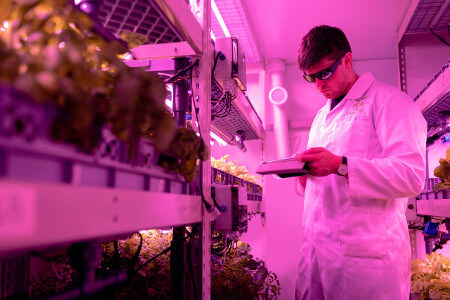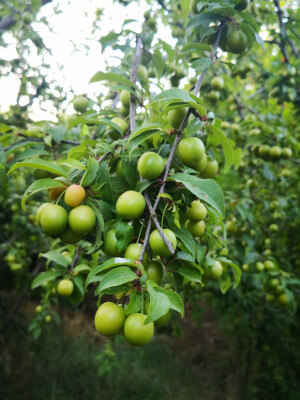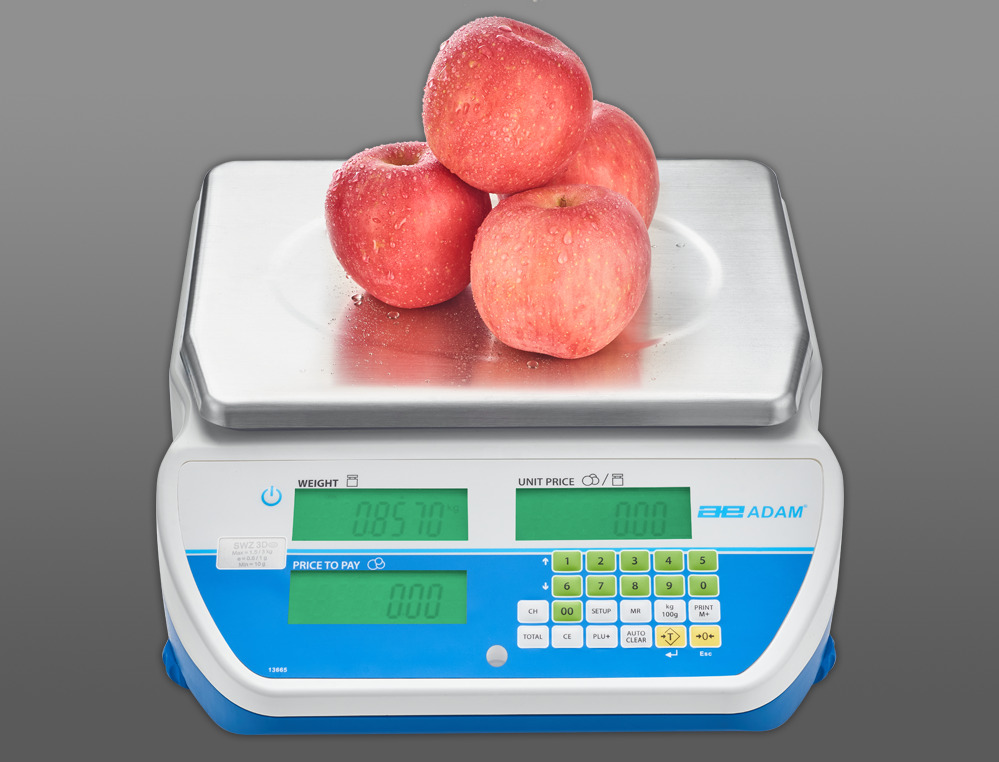How Scales & Balances Impact Agriculture

Weighing instruments are often used throughout agriculture, from the science of soil to weighing harvests or even monitoring livestock. In this blog post, we’ll explain how scales are used in farms and other agricultural settings.
What Type of Scales are Used for Farming?
Almost any type of weighing scale and balance you can think of is used in some way for agriculture. From moisture balances analyzing soil and seed samples to large platforms weighing harvests or animals, weighing is omnipresent.
While the features needed may vary, most scales and balances used in agriculture should be sturdy, easy to use and able to handle repetitive daily tasks. Features like counting and checkweighing are especially useful for packaging tasks, as are preset taring and selectable digital filtering. Users should consider models with low stabilization time for speedy operation. LED lights or a display that changes color to indicate checkweighing, as well as audible alarms, can save a lot of time during field measurements since you don’t even need to read the results to know if the weight is acceptable.
Laboratory
Moisture analyzers, analytical balances and precision balances can all be used to monitor the science of growing and harvesting, from making sure soil is healthy to checking seed conditions. When spraying pesticides, chemical additives or fertilizer, it’s important to get the quantity right in order to keep the food healthy for human and animal consumption, minimize waste and protect the environment. If you’re using a new product, it’s not a bad idea to create small batches to test the product on a limited selection of samples before using it on a large scale. Laboratory balances can also be used in quality testing applications on a wide variety of samples to make sure the product meets norms and regulatory guidelines.

Some products must meet specific benchmarks in order to qualify for seals or labels. For example, organic products in the Unites States are certified organic only if they have grown on soil where no prohibited substances were applied for three years before the harvest. That means if a farmer wants to label his fruits as organic, the soil must be checked for these substances and the amount can’t reach a specific threshold. There are more factors — including pest control practices, additive guidelines and animal raising practice — that must be thoroughly checked to make sure customers are truly getting what they pay for. Even if products are not organic, there are environmental and biological regulations that need to be met. Laboratory weighing equipment can help ensure compliance with these standards.
In addition to checking for chemicals, balances are used to check soil for a wide range of components, from microbial content, PH levels, nutrient content, humidity, oxygenation and more. Some plants need a specific PH level or amount of nutrients in the soil in order to grow. Other nutrients can become toxic depending on the amount. Compact scales or precision balances are used to make sure the sample size is compliant with laboratory norms, while analytical and semi-micro balances are used with smaller sample sizes and to measure various reagent and soil components. Features like formulation and percentage weighing can be helpful when creating soil analysis reports, which usually show the amount of substances as a percentage.
Moisture analysis is important for agriculture, as too much moisture can lead to bacteria, fungus or rotting crops, while too little moisture can lead to less nutrients and flammable fertilizer or compost. Analyzing the moisture content of seeds and crops can help users manage water levels, which is especially important in areas where precipitations are limited, and water usage may be limited due to droughts. Besides the general health of soil, moisture analysis can be used to predict and help prevent extreme weather patterns such as fires, flooding or droughts.
Compact and Bench Scales
Low capacity scales can be used for field verification or to portion feed or medicate animals to make sure they grow healthy. They can also be used to measure seed batches or large quantities of small ingredients (such as flour, beans, grains or berries). Ideally, these models should have a rechargeable battery for truly portable operation and speedy field weighing. Fast stabilization time is preferred, while checkweighing applications can speed up bulk packaging and sampling tasks. Checkweighing can also be useful to keep products within acceptable weight limits.

Trade Approved Scales
Small scale producers can often take their products and showcase them in local farmer’s markets, where they can sell various goods by weight using compact retail scales. For large scale producers, a trade-approved platform and indicator can be useful for supplying local products to nearby grocery store in bulk. If anything is sold by weight, the scale used to measure the item must be legal-for-trade by law. Be sure to consult local regulations to ensure you comply. Some trade approved scales can store and recall PLUs, which allows information such as price, weight and unit weight to be recalled with a few keystrokes.
High-Capacity Scales for Large Harvests
Floor scales, platforms and weighing beams aren’t only used for shipping. Farmers who take care of animals often use low-profile platforms to make sure the animals retain a healthy weight. They can also be used for large harvests, weighing bales of hay, shipping and packaging tasks. High-capacity scales are often combined with checkweighing capacities for speedy batching and sorting, since it eliminates the need for reading each result. Users can program limits and set audible alarms, LED lights, or both.
Weighing beams are popular since they can handle high capacities and can be combined with various containers to measure anything from live animals to produce. If you plan on using a platform to weigh animals, make sure it has a dynamic/animal weighing option to obtain accurate results.
Platforms can be polished stainless steel for easy cleaning, or a diamond-plate surface for superior grip and anti-slipping properties. Our platforms feature a low profile for easy loading. If you need to load barrels or other heavy loads, connect ramps to make loading and unloading even easier.

Washdown Scales for Raw Products
For producers who also refine or create food using their raw ingredients, washdown scales can be very useful. They’re easy to clean and can handle demanding operation. Their stainless-steel construction ensures even substances like fruit juice, jam or honey gets cleaned quickly and easily. Make sure to check the scale’s IP rating if you work with wet, messy or dusty ingredients, as a scale can have stainless steel housing but components that are not sealed. While washdown scales are mostly known for their resistance to water and spills, they’re also well-suited for powdered substances, including flour, sugar, spices or fine grains that could damage a scale’s mechanism by getting into nooks and crannies. Washdown scales are also well-suited for weighing animals who may track mud or dirt onto the weighing platform. If you need a platform and indicator combination, make sure both share the same IP rating.
Crane Scales for Heavy-Duty Weighing
Crane scales allow users to remotely weigh suspended loads. They’re commonly used with nets or containers with hooks to measure large quantities. Heavy quantities of fruits, vegetables, grains or feed bags can be hooked on the crane. Remote controlled operation helps improve safety, as operators can hook the container, then move to a safe distance to lift the heavy load.
Label Printing Scales for Harvest Management
Label printing scales can be very useful to set up shipping, packaging or even label stock in warehouses and silos. They are not trade-approved, so you can’t use them to sell by weight, but they are helpful when managing inventory, especially if a producer creates a lot of products that look similar. For example, a farmer could be using bags of feed that are difficult to tell apart, or both regular and organic apples of the same type. Labeling large batches helps tracing and shipping and can help reduce mistakes. It can also be very useful when refining raw ingredients through multi-stage processes, since products can be labelled according to their maturity, ripeness, moisture content or other variables.
Integrating Scales Into Farming Processes
We think of farming as low-tech work, but that hasn’t been the case for a long time. Farmers often use a wide variety of software to track information ranging from crop yield to shipping data. Weight can tell a producer a lot about their product, and long-term tracking can help them make more informed decisions.

Using connected scales and balances can allow users to analyze their operation and make changes to maintain growth and productivity. Most digital scales manufactured by Adam Equipment include a standard RS-232 interface, and many of our products can be fitted with a USB port as well.
Integrated scales allow farmers to plan and manage their inventory more easily. A lot of crops fail to meet their full yield potential because of various factors. Integration helps producers compare crops and data from previous years to see if some products are less likely to yield quality crops or if a harvest was better one year because they used a different fertilizer. Integrated scales also help reduce waste.
Tracking can be especially important because of regulations. Some countries and states have specific standards regarding agricultural waste and using a connected weighing system allows producers to keep track of their waste and find ways to reduce it.
In addition, tracing is important for health and safety reasons. Raw ingredients often get processed in multiple locations, and it’s important to make sure they haven’t been exposed to any contaminants. If a farmer sells nut-free batches of oats, tracing ensures that these oats remain nut-free and will not make customers sick. If somewhere along the line, the oats come into contact with nuts (say, at a packaging facility), tracing can help investigators find the fault and recall products from a certain point instead of grinding the entire operation to a halt.
As you just read, there are a lot of different scales available to help agriculture with weighing tasks. It can seem a bit overwhelming if you’re not sure where to start. If you need more information to find the right scale for agriculture, contact us. We’ll be happy to help you.

